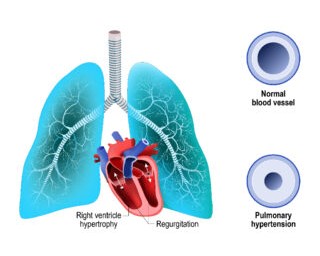Pulmonary Hypertension Types, Symptoms, and Treatment

Pulmonary hypertension (PH) is a chronic condition that leads to elevated blood pressure in the pulmonary arteries. It can result in serious complications, including right-sided heart failure, arrhythmias, and even death, if left untreated.
In this article, we’ll delve deeper into the causes, symptoms, and treatment of pulmonary hypertension.
Types of Pulmonary Hypertension
Pulmonary hypertension is categorized into five groups depending on the underlying causes. These include:
Group 1: Pulmonary Arterial Hypertension (PAH)
It’s characterized by the narrowing, stiffening, or thinning of the pulmonary arteries, which, in turn, restricts blood flow to the lungs. The most common causes of PAH include congenital heart defects, liver cirrhosis, scleroderma, HIV, and certain illegal drugs. In some cases, the cause may not be known (idiopathic PAH).
Group 2: PH Due to Left-Sided Heart Disease
It’s caused by problems in the left chambers of the heart. These include left ventricular heart failure, aortic valve disease, and mitral valve disease.
Group 3: PH Due to Lung Disease
This type of PH is caused by lung diseases, such as chronic obstructive pulmonary disorder (COPD), obstructive sleep apnea, and pulmonary fibrosis.
Group 4: PH Due to Blood Clots in the Lungs
This type of PH is caused by chronic blood clots in the lungs (pulmonary emboli) or scars from these blockages. If you’re diagnosed with this type of PH, it’s a good idea to consult a cardiologist.
Group 5: PH Due to Other Conditions
PH can be caused by other underlying ailments, such as sarcoidosis, vasculitis, metabolic disorders, blood disorders, kidney diseases, and tumors pressing against the pulmonary arteries.
Symptoms of Pulmonary Hypertension

The first symptom of pulmonary hypertension is usually shortness of breath. Most patients experience breathlessness while performing routine tasks, such as walking and climbing the stairs.
As the condition progresses, patients experience other symptoms, such as:
- Chest pain
- Dizziness
- Fainting
- Palpitations
- Fatigue
- Blue lips and skin
- Swelling in the ankles, legs, and abdomen
If you’re experiencing any of the aforementioned symptoms, make sure you consult pulmonary hypertension experts in your area.
Depending on the symptoms, PH is divided into four stages (or classes):
Class 1: No noticeable symptoms
Class 2: No symptoms at rest, but minor discomfort during routine physical activities
Class 3: No symptoms at rest, but intense shortness of breath during routine physical activities
Class 4: Symptoms are present at rest and during physical activity
Diagnosis and Treatment
When you visit a primary pulmonary hypertension specialist, the first thing they’ll do is ask about your symptoms and medical history. Also, they’ll examine your heart and lungs using a stethoscope.
Next, they’ll ask you to undergo various diagnostic tests, such as a chest X-ray and CT scan, Doppler echocardiogram, right heart catheterization, etc. These tests will help identify the underlying cause of PH.
The best pulmonary hypertension doctors determine the course of treatment depending on the root cause. Currently, PAH and PH due to blood clots are the only types of pulmonary hypertension that can be treated. For all other types of PH, doctors focus on managing the underlying disorders and symptoms.
Treatment of PH involves medications, such as diuretic pills, calcium channel blockers, and anticoagulants. Also, your doctor will recommend lifestyle and dietary changes to slow down the progression of pulmonary hypertension.
In Conclusion
If left untreated, pulmonary hypertension can lead to right-sided heart failure, arrhythmias, and bleeding in the lungs. Timely diagnosis and treatment can prevent your symptoms from worsening and improve your prognosis.
If you’ve been looking for a pulmonary hypertension cardiologist in India, make sure you reach out to Dr. C Raghu today.

